

CCK12 #LAK12 From Information Attention, Abundance to Engagement. Here is Marty Kaplan’s presentation on From Attention to Engagement.
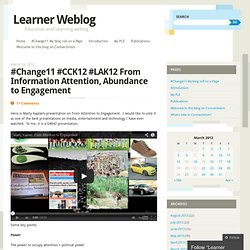
Www.equip123.net/docs/e3-beninfinal.pdf. Www.equip123.net/docs/e3-guyanafinal.pdf. Www.equip123.net/docs/e3-YSP.pdf. Www.equip123.net/docs/e3-CYM.pdf. Issue paper for Session 1 - Employability: Education, skills development and technology. Bridging knowledge gaps Globalization places a high premium on education and skills Globalization has intensified international competition between companies and countries in products and services, their design, distribution and cost.
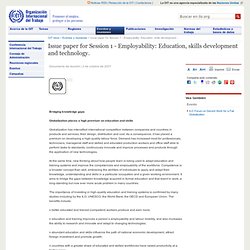
As a consequence, it has placed a premium on developing a high-quality labour force. Demand has increased most for professionals, technicians, managerial staff and skilled and educated production workers and office staff able to perform tasks to standards, continuously innovate and improve processes and products through the application of new technologies. At the same time, new thinking about how people learn is being used to adapt education and training systems and improve the competencies and employability of the workforce. EFA Global Monitoring Report. Education - Secondary Education - Key Issues. Today, the demand for secondary education worldwide is soaring due to progress towards universal primary school completion, large cohorts of young people searching for the key to a better life, and the global demand for an increasingly sophisticated labor force.
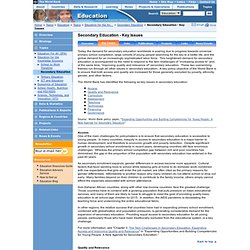
This heightened demand for secondary education is accompanied by the need to respond to the twin challenges of “increasing access to” and, at the same time, “improving quality and relevance of” secondary education. These two overarching themes run through all other issues in secondary education. A key policy objective of the World Bank is to ensure that both access and quality are increased for those generally excluded by poverty, ethnicity, gender, and other factors. The World Bank has identified the following as key issues in secondary education: Quality and Relevance. Improving access to secondary education in Kenya: what can be done? Www.uis.unesco.org/Library/Documents/global_education_digest_2011_en.pdf. International goals. The UIS is the official source of data used to monitor Education for All (EFA) and the education-related targets of the Millennium Development Goals (MDGs) as well as related international initiatives.
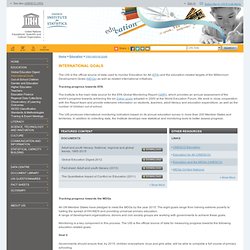
Tracking progress towards EFA The Institute is the main data source for the EFA Global Monitoring Report (GMR), which provides an annual assessment of the world’s progress towards achieving the six Dakar goals adopted in 2000 at the World Education Forum. We work in close cooperation with the Report team and provide extensive information on students, teachers, adult literacy and education expenditure, as well as the number of children out of school.
The UIS produces international monitoring indicators based on its annual education survey in more than 200 Member States and territories. In addition to collecting data, the Institute develops new statistical and monitoring tools to better assess progress. Tracking progress towards the MDGs Monitoring is a key component in this process. Disparities Hinder Access to Secondary Education for Young People. (c) I.Phetsiriseng Understanding the challenges facing access to secondary education in the Asia-Pacific requires much more than solely analyzing enrolment rates, but calls for a more comprehensive examination of many and multiple factors—including gender, socio-economic, ethnic and rural-urban disparities.
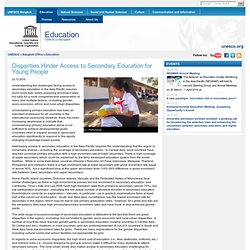
Universalizing primary education has been an important endeavour for all countries in the international community. Www.mp.gov.rs/resursi/dokumenti/dok7-eng-ETF_Secondary_education_in_OECD.pdf. Www.cipe.org/publications/flyers/pdf/thematic/youth.pdf. Empower Orphans. Grand Kids. Northern Starfish.
A conversation on TED.com: How can we empower kids to reshape the education system? *A TEDActive Education Project Question* Generation Waking Up: Igniting a Movement. World Teachers' Day 2011. 10,000 Young People: Designing the Future. Ever wondered what 10,000 young people could do to solve some of the world’s greatest problems?
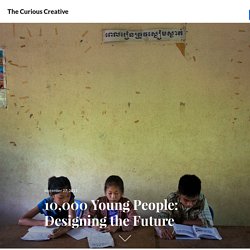
That’s what NoTosh is wanting to find out this month as we help reinvent the world’s most important ICT event, ITU Telecom World 11. The October 24-27 event is the flagship meeting of the world’s telecoms industries, brought together by the International Telecommunication Union (ITU), the specialised United Nations agency responsible for information and communication technologies. Youth Forum - 2011. As the unique regular platform, within the UN System, allowing youth to submit recommendations to Member States representatives at the highest decision-making level, the UNESCO Youth Forum held from 17 to 20 October 2011, brought together more than 500 youth voices from across the world to debate “How youth drive change”.
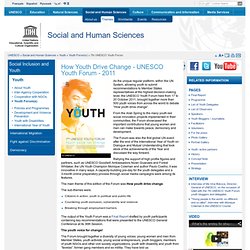
Ludovia 2011 : le numérique et les universités L’université est une matrice où l’on se sent mal à l’aise, mais où règne une certaine sécurité.
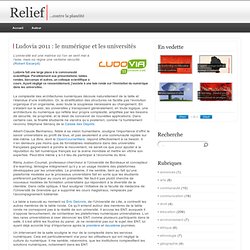
(Robert Escarpit) Ludovia fait une large place à la communauté scientifique. Parallèlement aux présentations, tables rondes, barcamps et autres, un colloque scientifique a cours. Ayant négligé ce rassemblement, j’assiste à une tale ronde sur l’immixtion du numérique dans les universités. La complexité des architectures numériques découle naturellement de la taille et l’étendue d’une institution.
Albert-Claude Benhamou, fidèle à sa vision humanitaire, souligne l’importance d’offrir le savoir universitaire au profit de tous, et pas seulement à une communauté repliée sur elle-même. Rémy Juston-Coumat, professeur-chercheur à l’Université de Bordeaux et concepteur d’e-learning, témoigne intègrement qu’il y a un usage modéré des plateformes développées par les universités. La table a basculé au moment où Éric Delcroix, de l’Université de Lille, a contredit les autres membres de la table ronde.
Google. Superhero School: An Epicenter for Disruptive Innovation. Not Just Slacktivism: Youth Become More Engaged Offline, Too. As Facebook and Twitter have come to play a larger role in getting the word out about issues such as unrest in Egypt, much of what is done using these social tools — particularly by younger users — has been criticized as “slacktivism.”
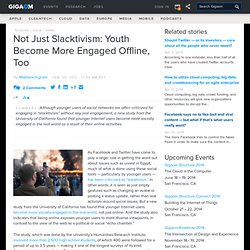
In other words, it is seen as just empty gestures such as changing an avatar or posting a status update, rather than real activism around social issues. But a new study from the University of California has found that younger Internet users become more socially engaged in the real world, not just online.
GLOBAL: OECD ministers debate education for new skills. The kinds of skills workers need are changing rapidly, and education and training systems must adapt to equip young people for different kinds of jobs, new technologies and unforeseen problems.
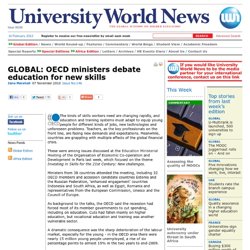
Teachers, as the key professionals on the front line, are facing new demands and expectations. Meanwhile, countries are grappling with multiple effects of the global financial crisis. These were among issues discussed at the Education Ministerial Meeting of the Organisation of Economic Co-operation and Development in Paris last week, which focused on the theme Investing in Skills for the 21st Century: New challenges. Ministers from 38 countries attended the meeting, including 32 OECD members and accession candidate countries Estonia and the Russian Federation, 'enhanced engagement' countries Indonesia and South Africa, as well as Egypt, Romania and representatives from the European Commission, Unesco and the Council of Europe.